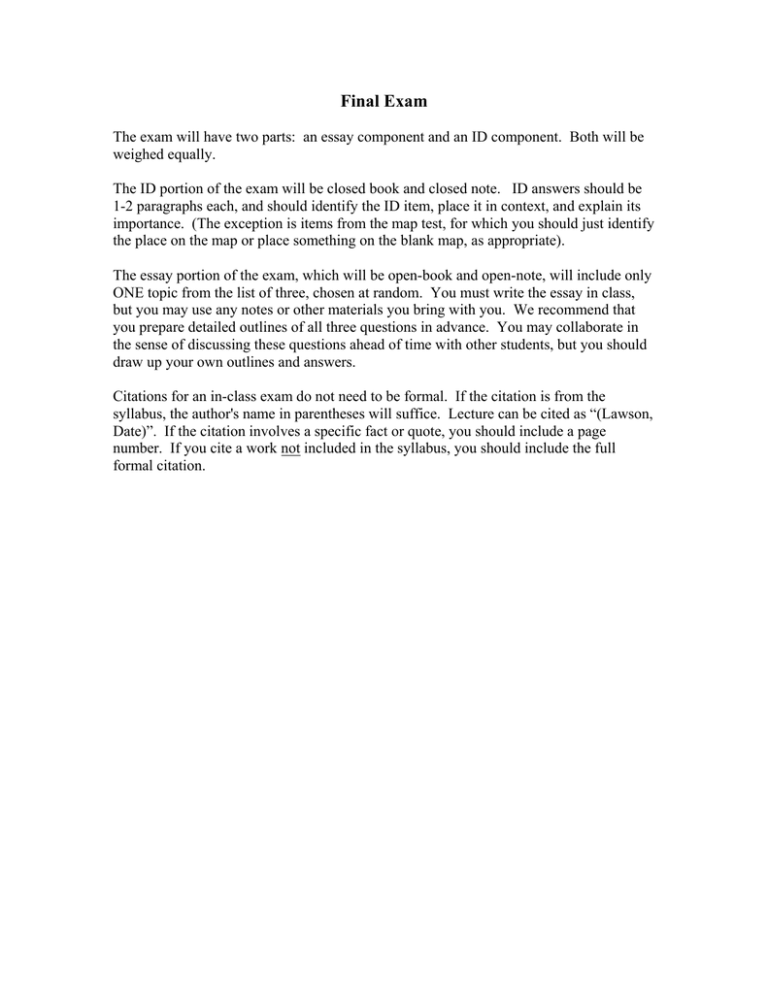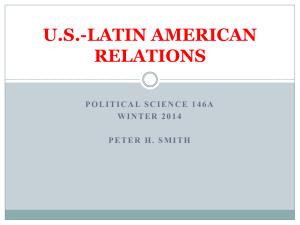Final Exam
advertisement

Final Exam The exam will have two parts: an essay component and an ID component. Both will be weighed equally. The ID portion of the exam will be closed book and closed note. ID answers should be 1-2 paragraphs each, and should identify the ID item, place it in context, and explain its importance. (The exception is items from the map test, for which you should just identify the place on the map or place something on the blank map, as appropriate). The essay portion of the exam, which will be open-book and open-note, will include only ONE topic from the list of three, chosen at random. You must write the essay in class, but you may use any notes or other materials you bring with you. We recommend that you prepare detailed outlines of all three questions in advance. You may collaborate in the sense of discussing these questions ahead of time with other students, but you should draw up your own outlines and answers. Citations for an in-class exam do not need to be formal. If the citation is from the syllabus, the author's name in parentheses will suffice. Lecture can be cited as “(Lawson, Date)”. If the citation involves a specific fact or quote, you should include a page number. If you cite a work not included in the syllabus, you should include the full formal citation. Potential essay topics 1. Gabriel García Márquez’s fictitious village Macondo is often described as a microcosm of Latin America. Which features does García Márquez portray accurately? Which does he exaggerate? Which does he downplay or ignore altogether? 2. Next week you find yourself talking with an acquaintance who has recently returned from vacation in Mexico. She remarks (boorishly) on how poor the country seems in comparison to the United States and how weak the rule of law seems to be. The reason, she feels, is that Mexicans have a different attitude toward time, civic responsibility, and financial dealings. As she puts it: “They are always talking about mañana, and everyone is on the take.” What sort of an explanation is this for underdevelopment and authoritarianism in Mexico? Do you agree with this perspective? What other explanations might you offer for relative poverty and weak rule of law in Mexico? 3. Evaluate the following statement: “Neoliberal democracy in Latin America is either a farce or a fraud, a comedy or a tragedy, depending on one’s perspective; it is certainly no cure for the region’s ills. The real problems that average Latin Americans confront – poverty, corruption, abuse at the hands of an indifferent state – remain unchanged.” Potential ID items 20 IDs will be drawn at random from the list below The term “Latin America” Latin America as a “living museum” The Conquest Iberia Castilian Tupac Amaru I Hispaniola Settler mortality smallpox Charles Anderson Latin American as a “living museum” Juan Santos Atahualpa Bourbon Reforms and the “Second Conquest” of Latin America viceroy fueros Maximilian Hernán Cortés Mexica Machu Picchu mita system serfdom encomienda latifundia “obedezco pero no cumplo” hacienda guilds criollo (creoles) and peninsulares (peninsulars) mestizo mulatto Primordialism and the social construction of race Genotype / phenotype (as these terms apply to race in Latin America) Brazil as a “racial democracy” “Money whitens” Macondo Big Mama Gabriel Garcia Márquez Magical realism “alchemists of the statutes” Jus primae noctis Nicanor Big Mama’s “intangible assets” Latin American “boom” (in literature) clientelism, caciquismo, coronelismo Marxism Dependency Theory core and periphery, metropole and satellites mode of insertion (in dependency theory) stages of dependency MNC’s Transfer pricing Mexican steroid hormone industry barbasco Syntex Farquinal and Proquivimex Imperialism Autarkic development Racist theories of Development Cultural theories of development Interpersonal trust “protestant ethic” argument Modernization theory (as it applies to economic development) Daniel Lerner, The Passing of the Traditional Society “Takeoff” phase stages of development Kuznets curve monoculture economy commodity cycles Urban bias comparative advantage Liberalism (in the European sense) Coase theorem factor endowments Gilberto Escobar’s shrimp business (and other ventures) Chinchillas Value-added chain Economies of scale Economies of learning infant industries import substituting industrialization (ISI) structuralism tariffs subsidies nationalization Raul Prebisch Declining terms of trade producer cartels OPEC Rent-seeking Stephen Haber Monterrey Group Obstacles to Mexican industrialization Porfiriato rent-seeking hyperinflation debt crisis IMF TINA austerity measures neoliberalism, economic liberalization, market-friendly reform, etc. inequality in Latin America shantytowns the “lost decade” Camilo Torres Pope John Paul II Vatican II preferential option for the poor syncretism Umbanda and Cndomblé Juan Diego, Virgin de Guadalupe Azuleika Sampaio Patricio Alvarez (in Colombia) The House of the Spirits Esteban Trueba Pedro Tercero García Barrabás (in The House of the Spirits) Clara del Valle Alba Trueba Blanca Trueba Pedro Segundo Tres Marías Miguel Some other major character or anecdote from The House of the Spirits Treatment of gender in The House of the Spirits Leftist, Rightist Salvador Allende Unidad Popular (Popular Unity) Christian Democratic Party (of Chile) National Party (of Chile) Radical Party (of Chile) MIR statute of guarantees General René Schneider General Carlos Prats “constitutionalists” in the Chilean armed forces Patria y Libertad coup d’état September 11, 1973 the “mummies” Truckers’ strike Jaime Guzmán Arturo Alessandri Eduardo Frei Sr. Orlando Letelier Plan Z La Moneda CODELCO bureaucratic authoritarianism Augusto Pinochet carabineros DINA CNI “caravan of death” Copiapó Comando Conjunto Manuel Rodríguez Patriotic Front Chilean plebiscite of 1978 Chilean plebiscite of 1989 Chilean Constitution of 1980 “Coalition for the No” binomial electoral system Manuel Contreras National Stadium in Santiago degollados General Sergio Arellano Stark Three ways Pinochet consolidated personal rule after coup Original junta members Oscar Bonilla Rodolfo Strange Nelson Morales Leal Chicago Boys National Stadium (Chile) Dawson Island Different types of coups in Latin America “National security doctrine” in Latin American militaries Jean Marc (Brazil) Dirty war in Argentina desaparecidos nunca más/nunca mais Plotline and main characters of La historia oficial Best reasons to prosecute Pinochet Best reasons not to prosecute Pinochet transitional justice lustration truth commissions amnesty laws (for human rights abuses) Baltasar Garzón Institutional Acts (Brazil) control of the episode, “dominio de los hechos” Samuel Huntington’s “torturer problem” Samuel Huntington’s “praetorian problem” military prerogatives civilian control of the military Hunter’s “electoral dynamic” authoritarian enclaves in the Chilean constitution of 1980 transitions to democracy in Latin America how Latin American democracies are fragile (according to Colburn) quality of democracy in Latin America (including public opinion) Concertación (Chile) The “two Chiles” Patricio Aylwin Eduardo Frei Jr. Ricardo Lagos Fernando Henrique Cardoso Josué (from Central Station) Dona Dora (from Central Station) Bom Jesús da Silva, Bahia (from Central Station) Bam-bam High corruption and low corruption Corruption in the Mexican media Main problems in the Mexican justice system and obstacles to reform Homicide rates in Mexico Effects of democratization on policing in Mexico Solutions to problems of policing in Mexico Militarization of policing in Mexico PRI PAN and PRD The “misrule of law” (from Holston) Squatters, squatter settlements Jardím das Camelias Privatization of justice justiceiros formalized usurpation Movimento dos sem terra (MST – Brazilian Landless People’s Movement) Ackel estate Adis real estate company Solutions proposed in class to the problem of unclear land title “dead capital” the “mystery of capital” informal sector of the economy “obstacles to formality” Fidel Castro Ché Guevara foco movement (foquismo) marxist Sendero Luminoso (Shining Path) Sandinista National Liberation Front (FSLN) FMLN MRTA EZLN (Zapatistas) Turn to the Left in Latin America Varieties of “leftism” in Latin America Andrés Manuel López Obrador Manuel Rosales Hugo Chávez Estado Zulia Teodoro Petkoff Un Nuevo Tiempo Néstor Kirchner Juan Perón, Peronism, Peronist party Plus: All IDs from the Map Test Plus: Answers to all items in the Pop Quiz


